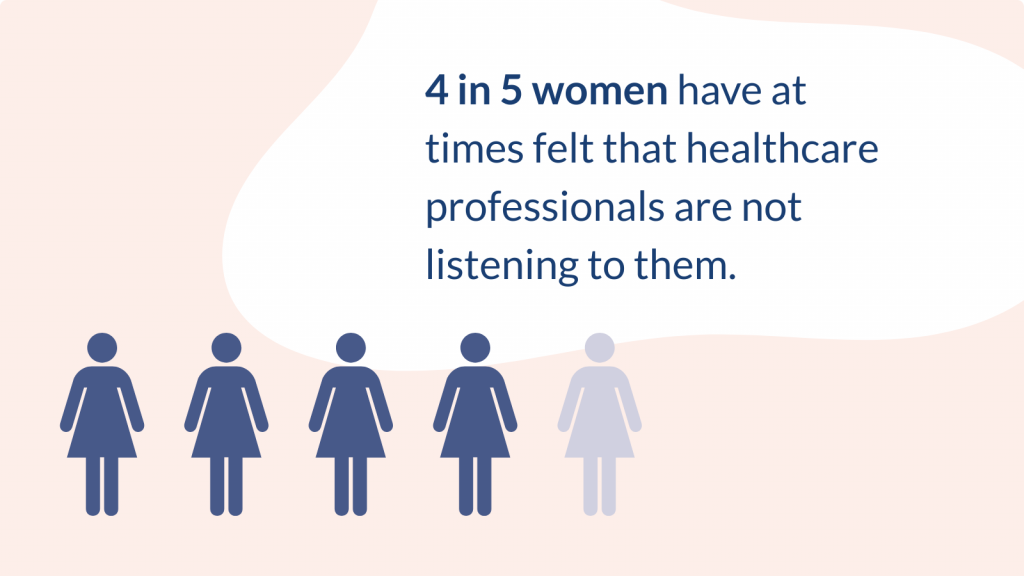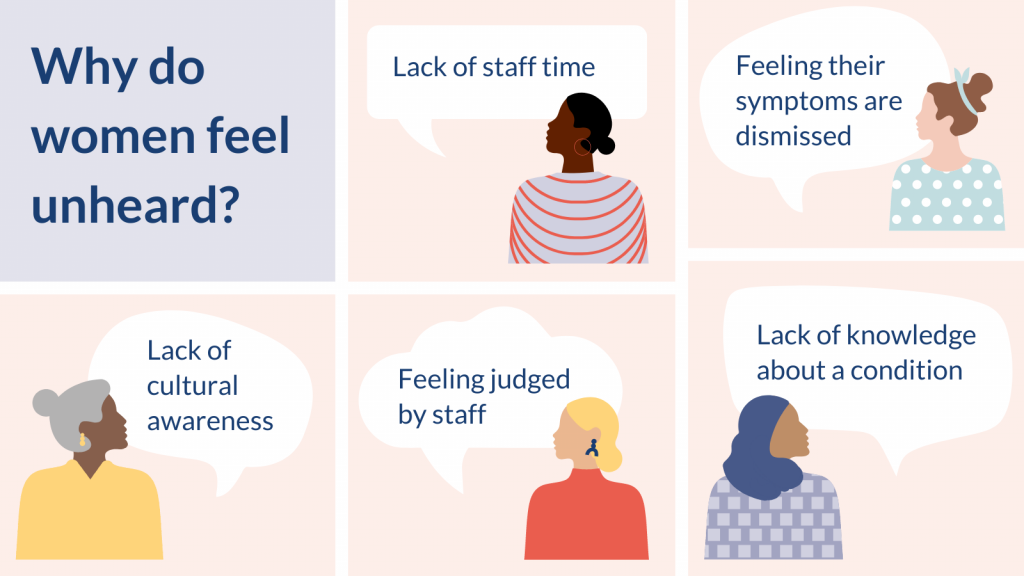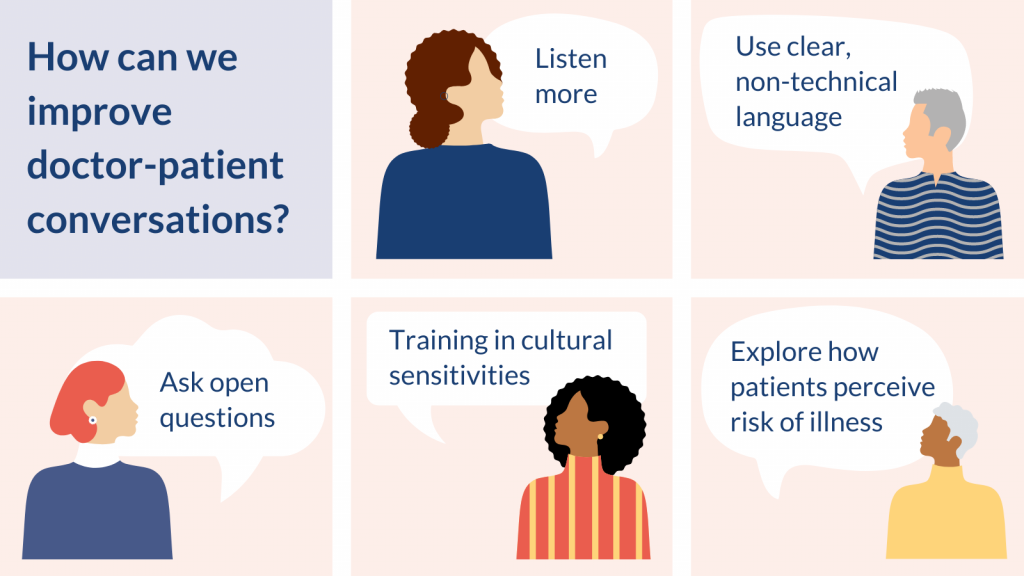The recent Women’s Health Strategy for England reported that more than 4 in 5 (84%) women responding to their survey had at times felt that their healthcare professionals were not listening to them. The finding was echoed by recent focus groups. We need to understand why this happens. Why don’t women feel listened to? What can be done to improve their conversations with healthcare professionals?
Meaningful conversations between patients and doctors are fundamental to shared decision-making, a central part of good NHS care. People should feel listened to. They need information to make a decision, and time and support to understand it. However, we know this does not always happen.
Healthcare professionals are time poor, and are often unable to spend as long as they would like with each patient. The time they do have therefore needs to be used well. Research can provide insight into how to have good conversations with patients.

This Collection brings together messages from research highlighted in accessible summaries - NIHR Alerts - over the past couple of years. In line with the Women’s Health Strategy, it draws on areas of healthcare specific to women, such as pregnancy and some cancers, along with common mental health conditions, osteoarthritis, dementia and other conditions which occur more often in women than men.
The Collection throws light on why women feel unheard and misunderstood, and suggests how to improve their conversations with healthcare professionals. The information is especially important for policy makers and healthcare staff.
Why do women feel unheard or misunderstood after a conversation with their doctor?

Staff attitude
“They [A&E practitioner] just think that it’s self-inflicted. You come here, you’re wasting our time, let’s get you patched up and we can get on with our business. They [people who self-harm] need to have somebody who sees them as a person, not as somebody that’s taking up their time” (carer).
Self-harming is much more common among young women than young men. Those who have self-harmed need to be listened to and have their personal experiences validated. But too often they may feel judged and disapproved of by staff. This can worsen their distress, as shown in recent research involving people who presented to accident and emergency (A&E) after self-harming.
Patients feel their symptoms are dismissed
"Patients did not see much sign of interest in their disorder [osteoarthritis] among practitioners, whereas they experienced its growing impact day-to-day." (researcher)
“I don't think [memory concerns] was taken that seriously. I don't think [the doctor] saw it as a problem. I saw it as a problem but I don't think he did.” (participant)
Osteoarthritis, dementia and chronic fatigue syndrome (CFS) are long-term conditions that are more common in women than men. Many people with these conditions feel that their concerns are dismissed.
For example, some people with osteoarthritis feel healthcare professionals do not fully recognise the impact of their pain. At the same time, some healthcare professionals feel that people have unrealistic expectations of treatment. Recent research found that the two groups have different concerns and treatment priorities, and neither spends enough time talking about osteoarthritis in consultations.
People with mild memory problems who are told they do not have dementia – but might get it in future – can feel left alone, uncertain about their future and with few services to help them, with healthcare professionals not seeing their situation as a problem.
Being taken seriously is important to people with chronic fatigue syndrome (CFS). Too often, they can feel they are denied support because the illness is not physically identifiable or verifiable through diagnostic tests.
No time to listen
Kidney failure is the last stage of chronic kidney disease, a condition more common in women than men. Many people with this condition are distressed, but their distress may often be overlooked or missed altogether. According to research, people with kidney failure felt staff did not have the time to listen to them. Simply asking how they are feeling could make a difference.
A lack of cultural awareness
“I was worried about how I was going to be perceived …there’s always a thing about being a strong black woman, and sometimes that’s not always the case. We’re not as strong as society expects us to be.” (participant)
A lack of cultural awareness among healthcare professionals can contribute to women feeling unheard or dismissed. This was a finding from a study involving new and expectant mothers from minority ethnic groups. The women were receiving help from perinatal mental health services. Professionals need to be aware that women may present with mental health difficulties in different ways based on their cultural beliefs, including the perceived need to be strong.
Tensions can arise when difficult decisions need to be made
“I have concerns that they really don’t understand what they are going to let themselves in for. I mean if [information is] available, why wouldn’t you want to know?” (doctor)
The quality of the doctor-patient conversation can affect how supported new mothers and their partners feel, and how able to make healthcare decisions. Tensions can arise between parents and doctors when parents are facing the difficult decision of whether to limit life support for their critically ill baby. Research showed that, when doctors presented a clinical recommendation rather than options, new mothers and their partners could be left unable to ask questions without challenging the doctor. Some passively accepted the recommendation; others responded angrily, which derailed the conversation and left parents and doctors in disagreement. Another study examined the many different ways that parents come to a decision after their baby is diagnosed with a serious condition before birth. Researchers also explored the reactions of doctors. They found that tensions could arise when approaches to decision-making did not align.
Doctors and patients may have different views about the risk of illness
Women at high risk of breast or ovarian cancer need to make decisions with their doctor about preventive action that may include surgery. Research has shown that women delay having surgery beyond the time recommended by doctors. The way women think about risk can affect their decision, and needs to be taken into account by doctors to avoid misunderstandings. For example, additional research found women rely on comparisons between themselves and affected relatives to make sense of their own risk of breast cancer. Their assessment may be different to a clinical risk estimate. This mismatch can affect the doctor-patient relationship and lead women to doubt preventive advice.
A lack of knowledge about a condition
“I used to bawl my eyes out… You know, you’d come back after going to the doctors and you cry because they just don’t realise.” (participant)
Hidradenitis suppurativa is a long-term, painful skin condition that affects about 3 times more women than men. It causes boils, abscesses and scarring, and can have a devastating impact on people’s quality of life. A lack of knowledge among healthcare professionals can leave people feeling misunderstood, unheard and dismissed. This was the finding from a study examining the experiences of people with the condition. These feelings could lead to mistrust and disengagement with services.
How can we improve doctor-patient conversations?

Listen more and use clear, non-technical language
Conversations go well when professionals actively listen to people, validate their concerns and use clear, non-technical language. Sharing tailored information promotes mutual trust and respect. This helps create a positive relationship, encourages people to engage with treatment decisions and manage their own condition. This was the conclusion of a recent study that examined patient and clinician views about the management of osteoarthritis in primary care, a condition more common in women than men.
Ask open questions
Simple changes to the way GPs ask questions about self-harm and suicidal thoughts could improve conversations with vulnerable patients and enable them to access help and support. A recent study found that doctors tended to ask closed questions and, in some instances, inadvertently reinforced the stigma associated with suicide. These approaches made it difficult for patients to speak openly and honestly. Asking open questions could help.
Provide good interpreters and culturally sensitive services
Good interpreters and culturally sensitive services can help women from some ethnic groups overcome barriers to accessing healthcare. This was highlighted in one study that examined barriers to taking up breast screening and in another looking at barriers to accessing mental healthcare during pregnancy and afterwards. Good interpreters mean all health information is passed on – this is not always the case when family members are translators, often due to embarrassment.
Explicitly discuss confidentiality with teenagers
Recent research highlighted the importance of explicitly discussing confidentiality with teenagers. Substantially more girls than boys experience sexual assault and common mental health conditions such as anxiety and depression. Teenagers who have been sexually assaulted need to feel in control of how their confidentiality is managed. And teenagers seeking help for anxiety or depression place a strong emphasis on trust.
Explore how patients perceive their own risk of illness
Exploring how women perceive their own risk of becoming ill could make doctor-patient conversations more effective and meaningful. Doctors often talk to patients about their risk of developing a disease such as cancer. However, the concept of disease risk can be difficult to understand. Patients may perceive their personal risk based on family history, for example, rather than a clinical score. A recent study advised healthcare professionals to find out and acknowledge how women judge their risk of breast cancer. Identifying where and why the patient’s perception differs from the clinical risk estimate may lead to a more productive conversation.
Train professionals in dementia specific communication skills
Dementia causes problems with memory, communication and decision-making, which can make conversations challenging. Several recent studies have highlighted the need to train hospital healthcare professionals to communicate with people living with dementia.
One looked at different ways of asking people with dementia to perform tasks or to agree to requests. Professionals' phrasing, tone and question construction altered the chance of a positive response. The researchers have developed training materials to help professionals communicate effectively with hospital patients who have dementia. Another study identified ways to improve hospital cancer care for people with dementia. These include keeping communication about cancer diagnosis and treatment clear, jargon-free, and at a comfortable (slow) pace.
People with dementia in hospital often have their views or wishes overlooked, even when they are able to express their opinions clearly. A further study concluded that skilled, earlier, more regular conversations between staff, people with dementia, and their families, would help. And the recent NIHR Evidence review: Continence, dementia, and care that preserves dignity concluded that staff benefit from training to help them communicate with people with dementia. Professionals need the skills and values that promote personal dignity and safety, including the use of appropriate language.
Conclusion
There is a gender health gap in the UK. Women tend to live longer than men but spend more of their life in poor health; they experience poorer outcomes in many areas of healthcare.
The Women’s Health Strategy aims to make sure women and girls feel listened to and have their concerns taken seriously at every stage. This can only happen if patients and healthcare professionals have good quality conversations.
Women who feel listened to and supported may be better able to make decisions that are right forthem, first time.
So why don’t women feel listened to? This Collection provides insight. It draws on recent NIHR research into health conditions which are specific to women, or more common in women. The research suggests that professionals’ attitudes, and lack of time, knowledge and cultural awareness, all play their part. A mismatch between patients’ and doctors’ views of the seriousness of a condition can also leave people feeling unheard.
Evidence can help improve conversations. This Collection provides recommendations based on research into health conditions which are specific to women, or more common in women. Open questions, careful listening and clear non-technical language are the basics of good conversation. Training in dementia-specific communication skills, and in cultural sensitivities, could help professionals. They need access to good interpreters to reduce reliance on family members. Different groups have different needs and teenagers in particular may appreciate knowing that the conversation is confidential. Other patients may believe their personal risk of a disease is higher (or lower) than a clinical risk score suggests. This can make for a difficult conversation for professionals to manage.
Healthcare professionals are working in pressured environments. They often lack the time they would ideally like to spend with each patient. In these circumstances, it is critical that each conversation with a patient is the best it can be. Women who feel listened to and supported may be better able to make decisions that are right for them, first time.
This Collection provides examples of NIHR research that aims to understand and improve patient-doctor conversations.
You may be interested to read
NIHR Evidence Collection 'Health information: are you getting your message across?' covers NIHR research on what happens when health information is not clear; how we can help people understand health information; and which groups of the population may need extra support.
NIHR Evidence Collection 'Care and decision-making in pregnancy: research reveals the support women need' explores recent NIHR research into supporting pregnant women to make informed decisions and receive the care they need.
Ongoing NIHR study to understand the experiences of women who use urogynaecological health services in the UK. Urogynaecology services treat a range of issues in women, including urinary incontinence, vaginal prolapse, recurrent urinary tract infections, bladder pain and pelvic floor injury after childbirth and faecal incontinence.
How to cite this Collection: NIHR Evidence: Women’s Health: Why do women feel unheard?; November 2022; doi: 10.3310/nihrevidence_54676
Author: Jemma Kwint, Senior Research Fellow (Evidence), NIHR
Disclaimer: This publication is not a substitute for professional healthcare advice. It provides information about research which is funded or supported by the NIHR. Please note that views expressed are those of the author(s) and reviewer(s) at the time of publication. They do not necessarily reflect the views of the NHS, the NIHR or the Department of Health and Social Care.
NIHR Evidence is covered by the creative commons, CC-BY licence. Written content and infographics may be freely reproduced provided that suitable acknowledgement is made. Note, this licence excludes comments and images made by third parties, audiovisual content, and linked content on other websites.